Book contents
- Frontmatter
- Contents
- List of Abbreviations
- Preface
- I INTRODUCTION
- II TOPICS OF THE DAY
- III WHAT IS A SOPHIST?
- IV THE ‘NOMOS’ – ‘PHYSIS’ ANTITHESIS IN MORALS AND POLITICS
- V THE SOCIAL COMPACT
- VI EQUALITY
- VII THE RELATIVITY OF VALUES AND ITS EFFECTS ON ETHICAL THEORY
- VIII RHETORIC AND PHILOSOPHY (Seeming and being, believing and knowing, persuading and proving)
- IX RATIONALIST THEORIES OF RELIGION: AGNOSTICISM AND ATHEISM
- X CAN VIRTUE BE TAUGHT?
- XI THE MEN
- Bibliography
- Index of passages quoted or referred to
- General Index
- Index of selected Greek words
X - CAN VIRTUE BE TAUGHT?
Published online by Cambridge University Press: 05 August 2015
- Frontmatter
- Contents
- List of Abbreviations
- Preface
- I INTRODUCTION
- II TOPICS OF THE DAY
- III WHAT IS A SOPHIST?
- IV THE ‘NOMOS’ – ‘PHYSIS’ ANTITHESIS IN MORALS AND POLITICS
- V THE SOCIAL COMPACT
- VI EQUALITY
- VII THE RELATIVITY OF VALUES AND ITS EFFECTS ON ETHICAL THEORY
- VIII RHETORIC AND PHILOSOPHY (Seeming and being, believing and knowing, persuading and proving)
- IX RATIONALIST THEORIES OF RELIGION: AGNOSTICISM AND ATHEISM
- X CAN VIRTUE BE TAUGHT?
- XI THE MEN
- Bibliography
- Index of passages quoted or referred to
- General Index
- Index of selected Greek words
Summary
‘Can you tell me, Socrates, whether virtue can be taught? Or is it a matter of practice, or natural aptitude or what?’ The urgency with which this question was debated in the fifth century has been mentioned in an introductory chapter (p. 25), where the meaning of areté was briefly outlined and it was suggested that it had powerful social implications inclining a writer to answer in one sense or another on grounds not purely rational. The debate reflected the clash between older aristocratic ideals and the new classes which were then rising to prominence under the democratic system of government at Athens and seeking to establish what would today be called a meritocracy. The claim of Sophists that areté could be imparted for fees by travelling teachers, instead of being freely transmitted by the precept and example of family and friends, and by association with ‘the right people’, coupled with the qualities of character native to any young man of good birth, was to the conservative-minded profoundly shocking. Philosophically, the question whether it was a matter of natural talent, or could be acquired by either teaching or assiduous practice, is chiefly important because, as a commonplace of the time, it was caught up in the thought of Socrates and Plato, who tried to answer it at a deeper level. Since the present study must be in part preparation for meeting these two great figures we may take a brief look at the kind of answers offered in and before their time. After-wards, of course, the topic became more commonplace still, till we get to Horace's ‘fortes creantur fortibus et bonis … doctrinased vim promovet insitam’.
The old idea is typified by Theognis in the sixth century. To his young friend Cyrnus he writes (vv. 27 ff. Diehl; the rest of the poetry makes it abundantly clear that for him ‘good ’ and ‘noble’ mean ‘of the right class’):
Out of the goodwill I bear you I tell you what I myself learned from good men when I was still a child.
- Type
- Chapter
- Information
- A History of Greek Philosophy , pp. 250 - 260Publisher: Cambridge University PressPrint publication year: 1977

